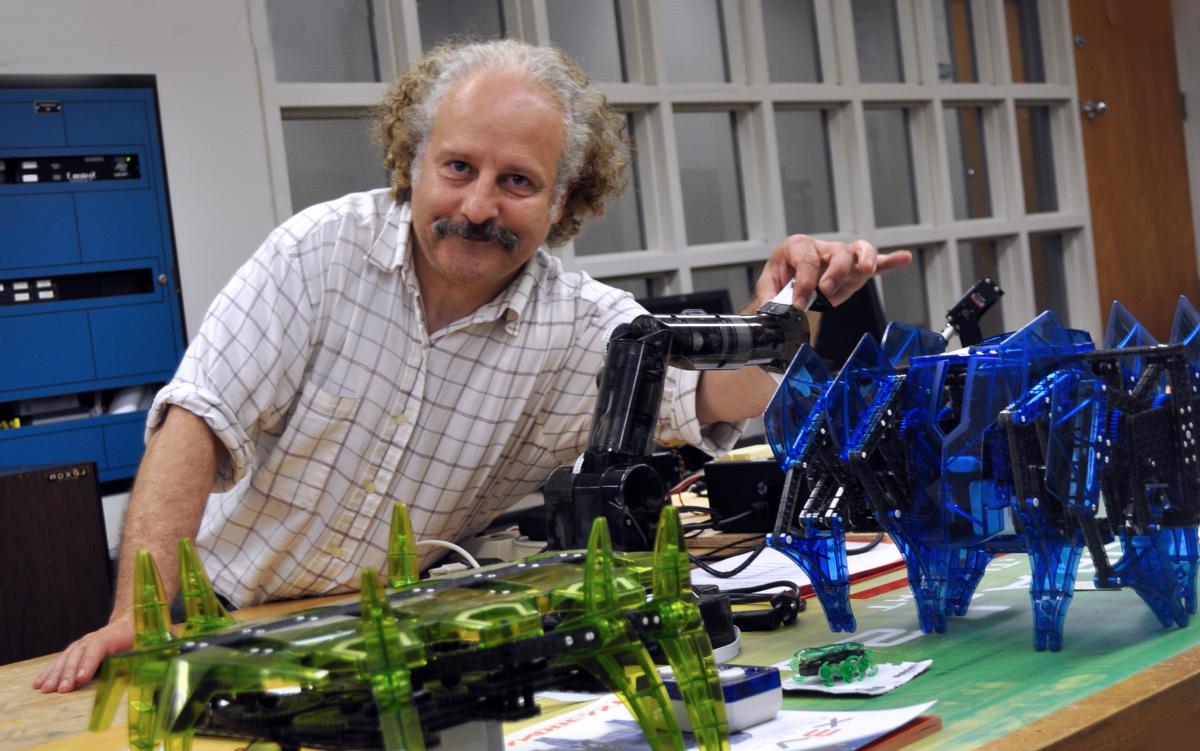Capitol professor stresses practical education, student engagement
June 29, 2017The mood in Professor Andrew Mehri's class in not what many would expect from a college course.
Instead of stressed-looking students trying to sustain attention during a lengthy lecture, Mehri's class is engaged and enthusiastic. The students gather around the monitors, sharing ideas and finding ways to bring their collaborative projects to completion. They are on-task and focused, and seem to be enjoying their work.
 Meanwhile, Professor Mehri keeps an eye on the proceedings and is ready to answer their questions or offer assistance.
Meanwhile, Professor Mehri keeps an eye on the proceedings and is ready to answer their questions or offer assistance.
"Most of the work they are doing is based on their own research,” explains Mehri, who also teaches robotics and engineering courses. “They can consult with me as needed, but they’re doing most of the work themselves. My lecture gets lighter and lighter as the course progresses.”
During the early weeks of each semester, Mehri carefully presents the foundational knowledge students will need. As their skill levels improve, however, he increases their role and level of responsibilty. The reason, he says, is simple: this is how the real world functions. In actual on-the-job situations, employees don't spend every day studying textbooks or listening to an instructor. Rather, they do hands-on work. They collaborate with each other. They solve problems and brainstorm solutions.
“What happens is that by the time they get out, they’re in that mode – they know how to research, they know how to find things and put them together," Mehri says. "If I’m just here to lecture and give them a test, then it would become a course like any other – six months later they will have forgotten everything. Not only that, but they won’t have developed the habits of success.”
Mehri’s vision for the course reflects the guiding philosophy of the institution where he teaches. The hands-on, practical approach has been favored at Capitol for decades – indeed, since its establishment in 1927. Founder Eugene Rietzke believed that engaging students in projects and tasks was as vital to learning as traditional instruction and study, and that guiding principle has persisted – primarily because decades of experience have shown it to be a recipe for success.
“The question I ask is ‘what do I want these students to be able to do afterwards,’” Mehri says. “I plant the seeds during the course so that they gain a level of independence. They become more curious and start to explore further avenues."
“At the same time, they’re working in collaboration with other students, doing group projects. So you have these different ingredients working together: the students are independent thinkers and at the same time co-operating. That combination is what I’m looking for.”
Capitol may be a small school, but it delivers outsized results when it comes to preparing students for the job market: more than 85% of graduates have found a job in their field within the first few months after graduation -- and many are snapped up by employers before they walk across the stage at commencement The hiring rate over six months after graduation is double the national average. Employers, including federal agencies as well as private corporations, hire Capitol graduates because they know the university's students are well-prepared and ready to contribute from day one.
In part, this is because of Capitol's technology focus. The university offers degrees in fields such as astronautical engineering, business administration, computer science, cyber and information security, electrical engineering, software engineering, and web development – all of which are in high demand among potential employers.
But it also reflects the hands-on experience students gain in classes such as Mehri's. Capitol students graduate not only with theoretical knowledge, but experience applying that knowledge to real-time situations. That makes Capitol graduates quick starters, and also provides them with the agility and flexibility needed in today’s job market, where roles and responsibilities can change quickly and new opportunities are always emerging.
“They can adapt quickly,” Mehri notes.


